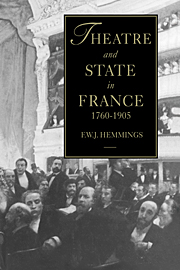Book contents
- Frontmatter
- Contents
- Chronology
- Introduction
- 1 The royal theatres of the ancien régime
- 2 The rise of the commercial theatre
- 3 Dramatic censorship down to its abolition
- 4 The liberation of the theatres
- 5 The royal theatres under the Revolution
- 6 The theatre in the service of the Republic
- 7 Re-establishment of the state theatres
- 8 Curbs on the commercial sector
- 9 Politics and the pit
- 10 The theatre in the provinces
- 11 The licensing system, 1814–1864
- 12 The state-supported theatres in the nineteenth century
- 13 The theatre in crisis: competition from the café-concert
- 14 Dramatic censorship in the nineteenth century
- 15 The private sector
- Notes
- Bibliography
- Guide to further reading
- Index
14 - Dramatic censorship in the nineteenth century
Published online by Cambridge University Press: 31 October 2009
- Frontmatter
- Contents
- Chronology
- Introduction
- 1 The royal theatres of the ancien régime
- 2 The rise of the commercial theatre
- 3 Dramatic censorship down to its abolition
- 4 The liberation of the theatres
- 5 The royal theatres under the Revolution
- 6 The theatre in the service of the Republic
- 7 Re-establishment of the state theatres
- 8 Curbs on the commercial sector
- 9 Politics and the pit
- 10 The theatre in the provinces
- 11 The licensing system, 1814–1864
- 12 The state-supported theatres in the nineteenth century
- 13 The theatre in crisis: competition from the café-concert
- 14 Dramatic censorship in the nineteenth century
- 15 The private sector
- Notes
- Bibliography
- Guide to further reading
- Index
Summary
With relatively brief intermissions, the system of preventive censorship as set up by Napoleon shortly after the coup d'état of 18 brumaire (9 November 1799) lasted all through the nineteenth century. The speed with which action was taken after the collapse of the Directory is some indication of the authorities' sensitivity to the importance of the stage as a possible focus of political dissent; less than a month after the new regime had been installed, a letter was despatched to all theatre managers informing them that the Ministry of Police required them to suspend performances of any play ‘which might become a source of disaffection’, and that in consequence all new plays accepted for production and ‘all dramatic works composed since 14 July 1789 relative to the Revolution, of which it was desired to stage revivals’ should undergo examination or re-examination. These provisions were confirmed and given even wider extension in a letter addressed by the three consuls to Lucien Bonaparte, then Minister of the Interior, by which he was enjoined to circularize all Paris theatre managers advising them that no new dramatic work was to be staged without his permission. ‘The head of the department of public instruction in your ministry is to be personally responsible for anything which, in the plays produced, could be construed as contrary to morality or to the principles of the social pact.’ Every provincial prefect was to be advised in a circular that no play he had not personally authorized was to be shown at any theatre within his zone of jurisdiction.
- Type
- Chapter
- Information
- Theatre and State in France, 1760-1905 , pp. 204 - 225Publisher: Cambridge University PressPrint publication year: 1994
- 2
- Cited by

